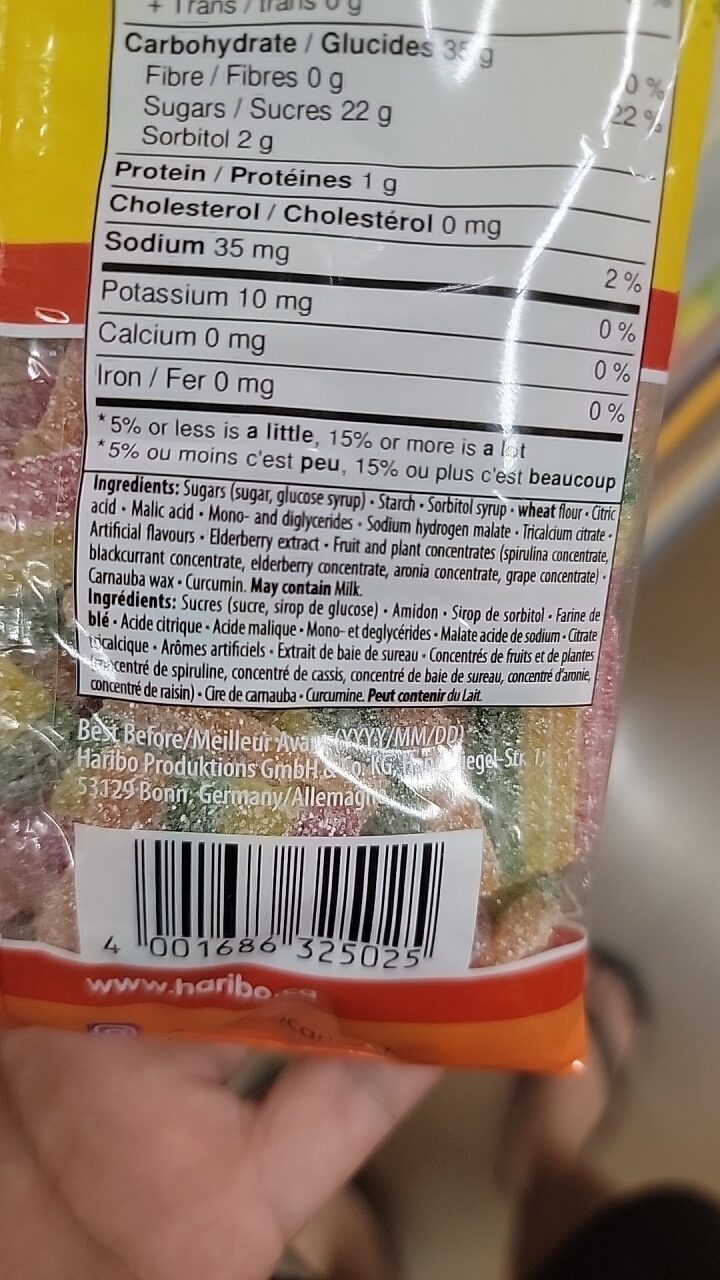
Barcode: 041600325025
DOUBTFUL
📝 Reason: Islamic rulings differ on some components present. Their permissibility depends on factors like animal origin and processing aids not specified here.
🏷️ Category: Candy
📄 Certificates: * 5% Or Less Is A Little, 15% Or More Is A Lot, *5% Or Less Is A Little, 15% Or More Is A Lot, May Contain Milk., Best Before/Meilleur, Www.Haribo.Com
Ingredients:
Details
Understanding the Halal Status of This Candy
When it comes to candy, many consumers, especially in Muslim communities, wonder about its halal status. This specific candy’s halal conformance is doubtful, primarily due to certain ingredients that may require deeper scrutiny. Islamic rulings vary on components, and the permissibility of certain ingredients greatly depends on their sourcing and the processing methods involved.
Ingredients Breakdown
The candy’s ingredients list includes:
- Sugars (sugar, glucose syrup) – Permissible in Islam. Derived from natural sources, these sugars are generally accepted.
- Starch – Permissible in Islam, as it originates from vegetables or plants.
- Sorbitol syrup – This sugar alcohol is permissible and commonly used in candy-making.
- Wheat flour – Accepted if not cross-contaminated by non-halal substances.
- Citric acid (E330) – Generally considered halal as it is a natural preservative and antioxidant. It’s derived mostly from citrus fruits.
- Malic acid (E296) – Another safe additive often derived from fruits, making it permissible in Islam.
- Mono- and diglycerides – Their status is complex; they usually derive from both animal and plant sources, but if sourced from plants, they are permissible.
- Sodium hydrogen malate – A permissible food additive often used for flavoring.
- Tricalcium citrate – Safe and permissible, typically used to fortify foods.
- Artificial flavors – These can be problematic depending on their source; some might originate from animal products, making their halal status uncertain.
- Elderberry extract – Permissible, as the elderberry is a fruit.
- Fruit and plant concentrates (spirulina, blackcurrant, elderberry, aronia, grape) – All are acceptable and do not present halal issues.
- Carnauba wax (E903) – Generally considered halal, it serves as a surface coating in candies.
- Curcumin – A plant-based colorant often derived from turmeric, this ingredient is halal.
- Milk – Acceptable if sourced from halal-certified animals.
Halal Certification Context
This candy lacks a clear halal certification, contributing to its doubtful status. Many halal-conscious consumers rely on certification to ensure products align with their dietary laws. The uncertainty around the source of some ingredients – particularly the artificial flavors and mono- and diglycerides – heightens the need for scrutiny.
Why Does it Matter?
For Muslims, consuming halal products is not just a preference but a requirement of their faith. This is why understanding each ingredient’s source is crucial. Laws derived from Islamic texts guide the permissibility of food products. Ingredients with doubtful sources or unclear processing paths can lead to a cautious stance from devout consumers.
Conclusion
In conclusion, while most ingredients in this candy are deemed permissible in Islam, the presence of artificial flavors and the lack of a clear halal certification raise valid concerns. Those looking to enjoy candies, especially in a halal context, should continue to ask questions and seek out certified products to ensure their peace of mind.
For more information and to explore other candy options, visit our site or check the packaging for reliable halal certification.
